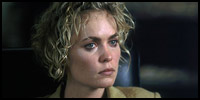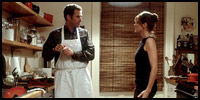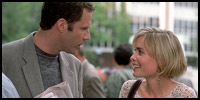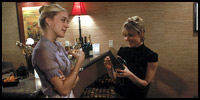
 |
|
Melinda and Melinda (2005) Cast: Radha Mitchell, Will Ferrell, Chloe Sevigny, Amanda Peet, Jonny Lee Miller, Brooke Smith, Chiwetel Ejiofor, Wallace Shawn, Larry Pine, Neil Pepe, Stephanie Roth Haberle, Vinessa Shaw, Daniel Sunjata, Josh Brolin, Steve Carell, Zak Orth, Arija Bareikis, Matt Servitto, Shalom Harlow 2005 – 99 minutes Rated: Reviewed by Dustin Putman, March 26, 2005.  What has happened to Woody Allen in the last five years? Once celebrated—and rightfully so—as one of the most sharp and intelligent of modern American filmmakers, his semi-annual projects have recently plummeted to the depressing and rather alarming depths of what a hack director would come up with trying to emulate the style of Allen. Allen has a knack for telling character stories in thoughtful ways; for writing dialogue so acerbically funny it stings; and, at his best, for having something truly emphatic to say about life and the human condition. "Melinda and Melinda," Woody Allen's latest cinematic endeavor, is not very thoughtful outside of its interesting general premise, only witty in spots, and more disorganized than emotionally dynamic. If it is a step above his career's last two disastrous low spots—2002's "Hollywood Ending" and 2003's "Anything Else"—it is still no better than 2001's mediocre "The Curse of the Jade Scorpion." That, ultimately, is not a very admirable place to be standing for an independent writer-director who has made such masterstrokes of art as 1979's "Manhattan," 1985's "The Purple Rose of Cairo," 1988's "Another Woman," 1992's "Husbands and Wives," and 1995's "Mighty Aphrodite," to name but only a small few.
What has happened to Woody Allen in the last five years? Once celebrated—and rightfully so—as one of the most sharp and intelligent of modern American filmmakers, his semi-annual projects have recently plummeted to the depressing and rather alarming depths of what a hack director would come up with trying to emulate the style of Allen. Allen has a knack for telling character stories in thoughtful ways; for writing dialogue so acerbically funny it stings; and, at his best, for having something truly emphatic to say about life and the human condition. "Melinda and Melinda," Woody Allen's latest cinematic endeavor, is not very thoughtful outside of its interesting general premise, only witty in spots, and more disorganized than emotionally dynamic. If it is a step above his career's last two disastrous low spots—2002's "Hollywood Ending" and 2003's "Anything Else"—it is still no better than 2001's mediocre "The Curse of the Jade Scorpion." That, ultimately, is not a very admirable place to be standing for an independent writer-director who has made such masterstrokes of art as 1979's "Manhattan," 1985's "The Purple Rose of Cairo," 1988's "Another Woman," 1992's "Husbands and Wives," and 1995's "Mighty Aphrodite," to name but only a small few.
 The set-up of "Melinda and Melinda" is both minimalist and fascinating: four friends chat over a dinner at a restaurant, and get to talking about how stories can either be viewed as funny or tragic, depending on the person's personality who is hearing it. Two of the friends—drama writer Max (Larry Pine) and comedic writer Sy (Wallace Shawn)—take turns spinning the same tale, but from markedly different viewpoints that go off on their own tangents. The lead character of both stories—one funny, one sad, both concurrently playing themselves out—is the off-beat, off-balance Melinda (Radha Mitchell).
The set-up of "Melinda and Melinda" is both minimalist and fascinating: four friends chat over a dinner at a restaurant, and get to talking about how stories can either be viewed as funny or tragic, depending on the person's personality who is hearing it. Two of the friends—drama writer Max (Larry Pine) and comedic writer Sy (Wallace Shawn)—take turns spinning the same tale, but from markedly different viewpoints that go off on their own tangents. The lead character of both stories—one funny, one sad, both concurrently playing themselves out—is the off-beat, off-balance Melinda (Radha Mitchell).
 In the dramatic tale, Melinda is portrayed as potentially suicidal and starved for love, a woman whose children have been taken from her by her ex-husband. She abruptly drops in on the dinner party of her old friend from school, Laurel (Chloe Sevigny), and her struggling actor husband, Lee (Jonny Lee Miller). Laurel agrees to let her stay for a while until she lands on her feet, but Melinda's outlook doesn't start to change for the better until she meets and falls in love with a soulful musician named Ellis (Chiwetel Ejiofor). Once a deep, dark secret from her past in revealed, however, Melinda begins to notice his attention straying from her and toward Laurel, whose own marriage is on the rocks.
In the dramatic tale, Melinda is portrayed as potentially suicidal and starved for love, a woman whose children have been taken from her by her ex-husband. She abruptly drops in on the dinner party of her old friend from school, Laurel (Chloe Sevigny), and her struggling actor husband, Lee (Jonny Lee Miller). Laurel agrees to let her stay for a while until she lands on her feet, but Melinda's outlook doesn't start to change for the better until she meets and falls in love with a soulful musician named Ellis (Chiwetel Ejiofor). Once a deep, dark secret from her past in revealed, however, Melinda begins to notice his attention straying from her and toward Laurel, whose own marriage is on the rocks.
 In the comedic tale, Melinda is a zany neighbor living in an apartment down the hall who stumbles into a dinner party held by feminist indie filmmaker Susan (Amanda Peet) and her aspiring actor husband Hobie (Will Ferrell), doped up from taking 28 sleeping pills and thirsty for some vodka. Once she clears her head, Melinda becomes friends with the distant couple. Yearning for love and with Hobie's own marriage nearing its end, these two would seem like kindred spirits. Hobie's hopes for starting a new relationship are dashed, though, when she begins seeing a new man, Billy (Daniel Sunjata).
In the comedic tale, Melinda is a zany neighbor living in an apartment down the hall who stumbles into a dinner party held by feminist indie filmmaker Susan (Amanda Peet) and her aspiring actor husband Hobie (Will Ferrell), doped up from taking 28 sleeping pills and thirsty for some vodka. Once she clears her head, Melinda becomes friends with the distant couple. Yearning for love and with Hobie's own marriage nearing its end, these two would seem like kindred spirits. Hobie's hopes for starting a new relationship are dashed, though, when she begins seeing a new man, Billy (Daniel Sunjata).
 Written and directed by Woody Allen (per the norm), "Melinda and Melinda" is a discouragingly problematic effort. Its initial idea of taking one tale and looking at it from diverse perspectives is fairly ingenious, but the end result is vastly underwhelming. First off, the story of Melinda is one that isn't very eventful and, thus, not much of an attention-grabber. Melinda is more of a tedious, difficult-to-read person than someone worth getting behind and rooting for—this is especially true in the dramatic interludes. There is little reason to care about her, or, for that matter, hardly anyone else. Woody Allen used to write three-dimensional, always original characters with beautiful, complicated hearts and souls. With one exception, the characters in "Melinda and Melinda" are strictly of the one-dimensional variety, and where their hearts and souls should be is a self-involved lump of black coal.
Written and directed by Woody Allen (per the norm), "Melinda and Melinda" is a discouragingly problematic effort. Its initial idea of taking one tale and looking at it from diverse perspectives is fairly ingenious, but the end result is vastly underwhelming. First off, the story of Melinda is one that isn't very eventful and, thus, not much of an attention-grabber. Melinda is more of a tedious, difficult-to-read person than someone worth getting behind and rooting for—this is especially true in the dramatic interludes. There is little reason to care about her, or, for that matter, hardly anyone else. Woody Allen used to write three-dimensional, always original characters with beautiful, complicated hearts and souls. With one exception, the characters in "Melinda and Melinda" are strictly of the one-dimensional variety, and where their hearts and souls should be is a self-involved lump of black coal.
 That one exception is Hobie, the mostly ignored, never appreciated husband of Susan whose only hope in life is to find a solid human connection. Portraying him in what is, for all intents and purposes, a nebbish part Woody Allen would have played fifteen years ago, is Will Ferrell (2004's "Anchorman: The Legend of Ron Burgundy"). Ferrell is quirky and lovable and ideally cast in a film that has him reel back his mania but not his infectiously funny energy and charm. His Hobie, and the possibility of him beginning a romance with Melinda, are the only elements of the plot worth giving a damn about. In the title role, Radha Mitchell is in fine form, far more creatively impulsive as an actress than she was in her sleepwalking part in 2004's "Finding Neverland." Mitchell plays Melinda two very different ways, and it is a testament to her, if not the script, that she manages to make one of the versions infinitely more appealing than the other.
That one exception is Hobie, the mostly ignored, never appreciated husband of Susan whose only hope in life is to find a solid human connection. Portraying him in what is, for all intents and purposes, a nebbish part Woody Allen would have played fifteen years ago, is Will Ferrell (2004's "Anchorman: The Legend of Ron Burgundy"). Ferrell is quirky and lovable and ideally cast in a film that has him reel back his mania but not his infectiously funny energy and charm. His Hobie, and the possibility of him beginning a romance with Melinda, are the only elements of the plot worth giving a damn about. In the title role, Radha Mitchell is in fine form, far more creatively impulsive as an actress than she was in her sleepwalking part in 2004's "Finding Neverland." Mitchell plays Melinda two very different ways, and it is a testament to her, if not the script, that she manages to make one of the versions infinitely more appealing than the other.
 This leads directly to the second major hindrance in "Melinda and Melinda." For a motion picture that is supposed to be telling diverse treatments of the same story, they are both too close in tone to make their point, negating the entire purpose of the movie. The dramatic section has its share of comedy, much of it stale and not up to snuff, and isn't so much tragic as just thoroughly uninteresting. By comparison, the comedic section does capture one's attention—to the point where it might have benefitted with the other section deleted entirely—but isn't out-and-out silly enough to make its point either. What the audience is left with, then, is one passable half, one interminable half, and a whole that fails to find an identity of its own. For a movie opening up with such promise, it sinks rather than swims soon after and doesn't ever gain the momentum necessary to take off.
This leads directly to the second major hindrance in "Melinda and Melinda." For a motion picture that is supposed to be telling diverse treatments of the same story, they are both too close in tone to make their point, negating the entire purpose of the movie. The dramatic section has its share of comedy, much of it stale and not up to snuff, and isn't so much tragic as just thoroughly uninteresting. By comparison, the comedic section does capture one's attention—to the point where it might have benefitted with the other section deleted entirely—but isn't out-and-out silly enough to make its point either. What the audience is left with, then, is one passable half, one interminable half, and a whole that fails to find an identity of its own. For a movie opening up with such promise, it sinks rather than swims soon after and doesn't ever gain the momentum necessary to take off.
 Woody Allen hasn't made a good film since 2000's deliciously hilarious and heartfelt "Small Time Crooks," and his losing streak continues with "Melinda and Melinda." The ambitions of the premise are lost upon a pedestrian character whose life isn't worth seeing put on the screen one time, let alone twice in the same 99 minutes. It all gets to be too much even with too little of worth being offered to the viewer. The rival tones are, strangely enough, not inconsistent enough to make the intended point that life is fraught with equal measures of good and bad, happy and sad, and Allen's written banter, while still better than most anyone in quick, self-deprecating wit, lacks the freshness and spontaneity he once had in the '90s. As the title suggests, "Melinda and Melinda" features two renditions of the same person. Woody Allen would have been smart to scrap them both and start from scratch.
Woody Allen hasn't made a good film since 2000's deliciously hilarious and heartfelt "Small Time Crooks," and his losing streak continues with "Melinda and Melinda." The ambitions of the premise are lost upon a pedestrian character whose life isn't worth seeing put on the screen one time, let alone twice in the same 99 minutes. It all gets to be too much even with too little of worth being offered to the viewer. The rival tones are, strangely enough, not inconsistent enough to make the intended point that life is fraught with equal measures of good and bad, happy and sad, and Allen's written banter, while still better than most anyone in quick, self-deprecating wit, lacks the freshness and spontaneity he once had in the '90s. As the title suggests, "Melinda and Melinda" features two renditions of the same person. Woody Allen would have been smart to scrap them both and start from scratch.
|
© 2008 by Dustin Putman |














